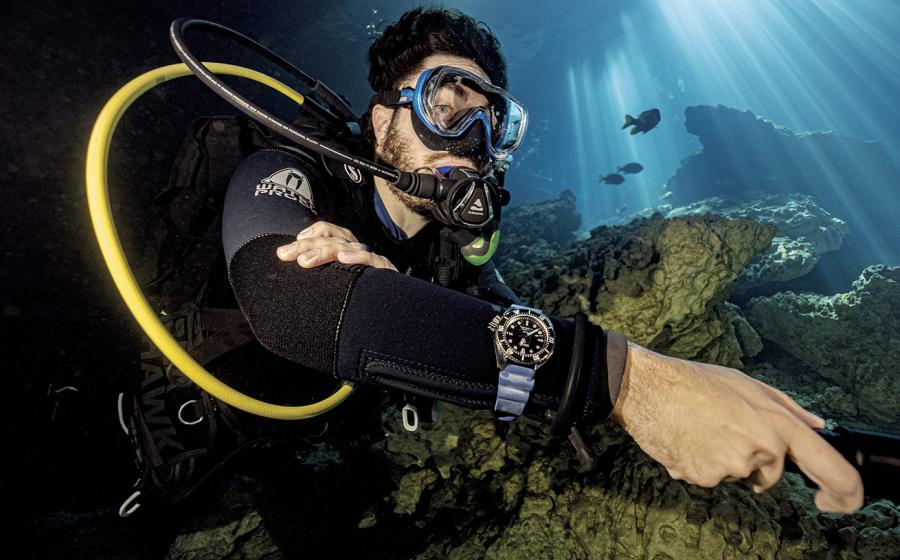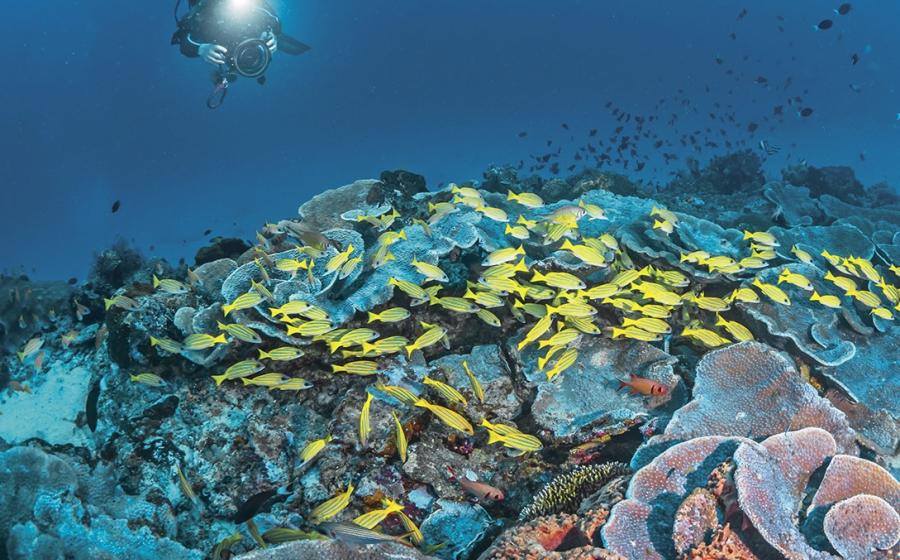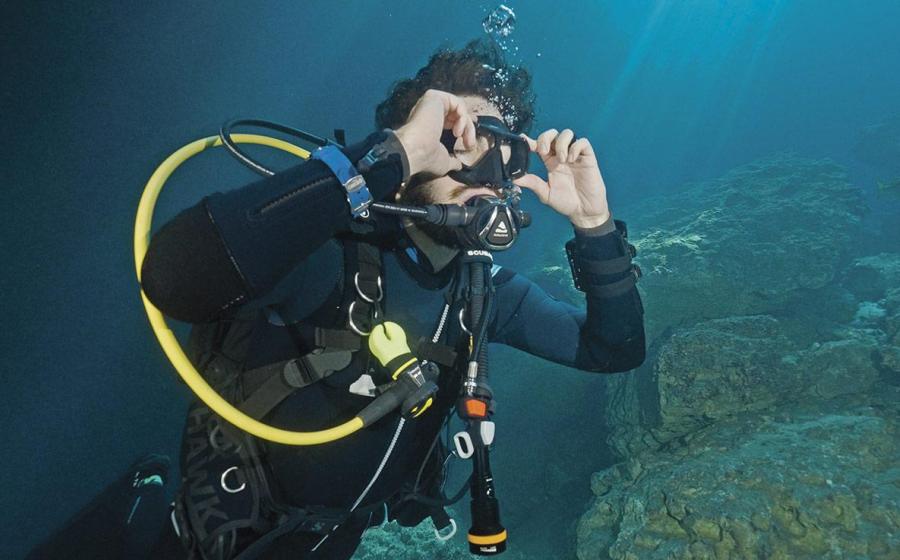Smoking and Diving: A Lethal Combination?
October 2000
By Ernest Campbell
I'm a Smoker--Can I Dive?
Ed.'s Note: Answers to questions are offered as information only and not as medical diagnosis or advice and should always be used in conjunction with advice from your personal diving physician.
Q: I have been a smoker for eight years (a pack a day). Can I dive? What kinds of problems can I expect?
via e-mail
A: The bottom line: Smoking and diving is a bad combination. Most of the risks associated with smoking and diving are related to long-term usage--the chronic lung disease that smoking produces over many years.
The emphysema that is caused can produce air-filled dilations. These small spaces of trapped air can expand when you ascend, markedly increasing your chances of pulmonary barotrauma (burst lung) and arterial gas embolism.
Smoking also causes an increase in bronchial mucous production and paralysis of the cilia. The function of these cilia cells is to remove the mucous (and the dust and dirt that has been trapped in it) from the lungs--it ends up in the back of your throat and you swallow it. Without these cells, the only way to get the mucous out of the lungs is to cough it out. Mucous plugs then become dangerous to the diver, setting the stage for air-filled sacs that lead to rupture upon ascent.
One other potential problem is the reduction in oxygen saturation and the increase in carbon dioxide retention. At depth, this could become a problem with the increased partial pressures of changing depths. I'm not aware of any studies relating to carbon monoxide retention in divers, but it's a good idea to refrain from smoking just before diving, as most smokers have at least 10 parts per million of carbon dioxide in their blood on a chronic basis--and this will increase as the diver descends to depth.
You should get a good physical exam, chest X-ray and pulmonary functions exam (spirometry). If bullous cystic disease--blisters on the surface of the lung--is suspected, a spiral CT scan of the lungs would be helpful. If there is airway restriction, emphysema or trapped air in any form, then there is the possibility of pulmonary barotrauma and arterial gas embolism with ascent from depth.
We hope you'll quit smoking.
For more information, see www.scuba-doc.com/smkndvng.htm.
Diving After a Concussion
Q: My husband just suffered a concussion. His physician cleared him for doing his open-water certification dives next weekend. Is it OK for him to dive after a concussion?
via e-mail
A: If your husband has no after-effects from the trauma--memory loss, dizziness, recurring headaches, vertigo or problems walking--then he should be able to dive six weeks after the accident, with his doctor's approval. However, if he had amnesia for a week or two, he should wait six to nine months before diving. His neurologist or neurosurgeon should be consulted before any decision to dive is made.
How Do Allergies Affect Diving?
Q: I've got allergies and get a shot for them once a month. Can I dive?
via e-mail
A: Diving with allergies is usually OK unless you have severe allergic rhinitis (swollen, congested nasal passages). If the shot that you take monthly controls your symptoms, then you should have little problem diving.
The main difficulty that people have with allergies is difficulty clearing their ears on descent, often leading to damaged middle ears.
Laser Surgery or Intacts--Which Is Better for Divers?
Q: I just finished reading "Vision Quest: 10 Ways to See Better Under Water" on the RSD web site and I was wondering whether intacts would be better for diving, compared to laser surgery.
via e-mail
A: Corneal ring segments or intacts are an alternative to keratotomy by reshaping your cornea, thereby correcting its refraction. Intacts are tiny plastic arcs that are surgically placed and are supposed to remain permanently within your cornea. Their main benefit is that they can be removed or replaced unlike other refractive surgery procedures such as radial keratotomy or LASIK, which are permanent. Intacts are used only for people who have mild levels of nearsightedness with little to no astigmatism.
There haven't been any studies on the subject, so it's difficult to say whether radial or laser keratotomy or intacts would be better for divers, though there is a benefit to being able to remove or change the rings if your prescription changes.
When Can I Dive After Septo-Rhinoplasty?
**Q: I had septo-rhinoplasty recently. It was very successful and I am breathing great now. How long must I wait before starting the confined water part of my certification course?
I also wear a bite plane at night and sometimes experience soreness and popping in my jaw (temporomandibular dysfunction--TMJ--has never been mentioned by either my dentist or physician). When I tried breathing through a regulator, I noticed some pain in my jaw. How hard will I have to bite down on the mouthpiece while diving?**
via e-mail
A: Your septoplasty should help you with clearing as you descend and ascend. If your surgeon has cleared you to resume your normal activity, then you should be able to dive without difficulty four to six weeks after the surgery.
Your jaw pain may be the result of a poorly fitting regulator mouthpiece. Or you might be clamping down on your mouthpiece too tightly. Jaw fatigue and pain do not have to ruin a dive. Several companies make mouthpieces that allow for a diver's overbite and have an extended bite platform that includes the molars. One manufacturer--SeaCure--makes a moldable mouthpiece that may eliminate the discomfort that you're experiencing. They are widely available at dive shops and are inexpensive.
Can I Dive With One Lung?
Q: I recently had my left lung removed. Believe it or not, I am a very active and healthy person. When I asked my surgeon if I could continue to dive, he said that I should wait a year. I am 45 years old and have logged over 300 dives. I'd like advice from a doctor who dives.
via e-mail
A: The first difficulty facing you is the reason you had your surgery in the first place. If this is a problem that is affecting your remaining lung, then you probably should not dive.
There are a couple of reasons why you may not be fit to dive. There has been a decrease in your lung function due to loss of tissue. If you have excellent lung function tests, which would indicate that you'd have little chance of low oxygen levels (hypoxia) at depth, then your doctor might allow you to dive. For more information, see www.scuba-doc.com/pulprbs.html.
After the removal of a lung, the space is filled with fluid and serum during the healing process. However, if there are air pockets mixed with the serum and fluid, resulting in air trapping, then there will be a problem with diving due to Boyle's law. This would be the most likely reason that your doctor would not clear you to return to diving. For more information, see www.scuba-doc.com/pulbt.html.
A thorough study to ascertain your pulmonary functions, a spiral CT scan to determine the absence of air pockets and possibly a pulmonary stress test in a recompression chamber should help your physician determine if you can dive again.
Can I Dive With Meniere's Disease?
Q: My Meniere's disease has been stable and I've experienced no dizziness for 10 years. I would like to try scuba. Can I?
via e-mail
A: Meniere's disease is a problem of the inner ear with no known cause. When symptoms occur, it's called an "attack" or acute labyrinthitis. The symptoms include dizziness, a feeling of fullness in the ear and tinnitus (a roaring sound in the ear). The dizziness is a spinning or whirling feeling and may cause problems with balance. Some people feel nauseated and vomit during an attack. Some people also notice some hearing loss, especially with sounds that have a low tone. These symptoms can easily be confused with an inner ear decompression accident.
Since you have been attack-free for 10 years, it would appear that you are under no increased risk for vertigo under water. However, there is no guarantee that the effects of pressure won't cause an attack of Meniere's. A "test of pressure" in a hyperbaric chamber might be helpful in sorting this out.
_Ernest S. Campbell, M.D., FACS, makes his home in Orange Beach, Ala. He is a retired surgeon, avid diver and webmaster of "Diving Medicine Online" (www.scuba-doc.com).
Please send your dive medicine questions to RSD, 6600 Abercorn St., Suite 208, Savannah, GA 31405. Fax: (912) 351-0735. E-mail: [email protected]._
October 2000
By Ernest Campbell
I'm a Smoker--Can I Dive?
Ed.'s Note: Answers to questions are offered as information only and not as medical diagnosis or advice and should always be used in conjunction with advice from your personal diving physician.
Q: I have been a smoker for eight years (a pack a day). Can I dive? What kinds of problems can I expect?
via e-mail
A: The bottom line: Smoking and diving is a bad combination. Most of the risks associated with smoking and diving are related to long-term usage--the chronic lung disease that smoking produces over many years.
The emphysema that is caused can produce air-filled dilations. These small spaces of trapped air can expand when you ascend, markedly increasing your chances of pulmonary barotrauma (burst lung) and arterial gas embolism.
Smoking also causes an increase in bronchial mucous production and paralysis of the cilia. The function of these cilia cells is to remove the mucous (and the dust and dirt that has been trapped in it) from the lungs--it ends up in the back of your throat and you swallow it. Without these cells, the only way to get the mucous out of the lungs is to cough it out. Mucous plugs then become dangerous to the diver, setting the stage for air-filled sacs that lead to rupture upon ascent.
One other potential problem is the reduction in oxygen saturation and the increase in carbon dioxide retention. At depth, this could become a problem with the increased partial pressures of changing depths. I'm not aware of any studies relating to carbon monoxide retention in divers, but it's a good idea to refrain from smoking just before diving, as most smokers have at least 10 parts per million of carbon dioxide in their blood on a chronic basis--and this will increase as the diver descends to depth.
You should get a good physical exam, chest X-ray and pulmonary functions exam (spirometry). If bullous cystic disease--blisters on the surface of the lung--is suspected, a spiral CT scan of the lungs would be helpful. If there is airway restriction, emphysema or trapped air in any form, then there is the possibility of pulmonary barotrauma and arterial gas embolism with ascent from depth.
We hope you'll quit smoking.
For more information, see www.scuba-doc.com/smkndvng.htm.
Diving After a Concussion
Q: My husband just suffered a concussion. His physician cleared him for doing his open-water certification dives next weekend. Is it OK for him to dive after a concussion?
via e-mail
A: If your husband has no after-effects from the trauma--memory loss, dizziness, recurring headaches, vertigo or problems walking--then he should be able to dive six weeks after the accident, with his doctor's approval. However, if he had amnesia for a week or two, he should wait six to nine months before diving. His neurologist or neurosurgeon should be consulted before any decision to dive is made.
How Do Allergies Affect Diving?
Q: I've got allergies and get a shot for them once a month. Can I dive?
via e-mail
A: Diving with allergies is usually OK unless you have severe allergic rhinitis (swollen, congested nasal passages). If the shot that you take monthly controls your symptoms, then you should have little problem diving.
The main difficulty that people have with allergies is difficulty clearing their ears on descent, often leading to damaged middle ears.
Laser Surgery or Intacts--Which Is Better for Divers?
Q: I just finished reading "Vision Quest: 10 Ways to See Better Under Water" on the RSD web site and I was wondering whether intacts would be better for diving, compared to laser surgery.
via e-mail
A: Corneal ring segments or intacts are an alternative to keratotomy by reshaping your cornea, thereby correcting its refraction. Intacts are tiny plastic arcs that are surgically placed and are supposed to remain permanently within your cornea. Their main benefit is that they can be removed or replaced unlike other refractive surgery procedures such as radial keratotomy or LASIK, which are permanent. Intacts are used only for people who have mild levels of nearsightedness with little to no astigmatism.
There haven't been any studies on the subject, so it's difficult to say whether radial or laser keratotomy or intacts would be better for divers, though there is a benefit to being able to remove or change the rings if your prescription changes.
When Can I Dive After Septo-Rhinoplasty?
**Q: I had septo-rhinoplasty recently. It was very successful and I am breathing great now. How long must I wait before starting the confined water part of my certification course?
I also wear a bite plane at night and sometimes experience soreness and popping in my jaw (temporomandibular dysfunction--TMJ--has never been mentioned by either my dentist or physician). When I tried breathing through a regulator, I noticed some pain in my jaw. How hard will I have to bite down on the mouthpiece while diving?**
via e-mail
A: Your septoplasty should help you with clearing as you descend and ascend. If your surgeon has cleared you to resume your normal activity, then you should be able to dive without difficulty four to six weeks after the surgery.
Your jaw pain may be the result of a poorly fitting regulator mouthpiece. Or you might be clamping down on your mouthpiece too tightly. Jaw fatigue and pain do not have to ruin a dive. Several companies make mouthpieces that allow for a diver's overbite and have an extended bite platform that includes the molars. One manufacturer--SeaCure--makes a moldable mouthpiece that may eliminate the discomfort that you're experiencing. They are widely available at dive shops and are inexpensive.
Can I Dive With One Lung?
Q: I recently had my left lung removed. Believe it or not, I am a very active and healthy person. When I asked my surgeon if I could continue to dive, he said that I should wait a year. I am 45 years old and have logged over 300 dives. I'd like advice from a doctor who dives.
via e-mail
A: The first difficulty facing you is the reason you had your surgery in the first place. If this is a problem that is affecting your remaining lung, then you probably should not dive.
There are a couple of reasons why you may not be fit to dive. There has been a decrease in your lung function due to loss of tissue. If you have excellent lung function tests, which would indicate that you'd have little chance of low oxygen levels (hypoxia) at depth, then your doctor might allow you to dive. For more information, see www.scuba-doc.com/pulprbs.html.
After the removal of a lung, the space is filled with fluid and serum during the healing process. However, if there are air pockets mixed with the serum and fluid, resulting in air trapping, then there will be a problem with diving due to Boyle's law. This would be the most likely reason that your doctor would not clear you to return to diving. For more information, see www.scuba-doc.com/pulbt.html.
A thorough study to ascertain your pulmonary functions, a spiral CT scan to determine the absence of air pockets and possibly a pulmonary stress test in a recompression chamber should help your physician determine if you can dive again.
Can I Dive With Meniere's Disease?
Q: My Meniere's disease has been stable and I've experienced no dizziness for 10 years. I would like to try scuba. Can I?
via e-mail
A: Meniere's disease is a problem of the inner ear with no known cause. When symptoms occur, it's called an "attack" or acute labyrinthitis. The symptoms include dizziness, a feeling of fullness in the ear and tinnitus (a roaring sound in the ear). The dizziness is a spinning or whirling feeling and may cause problems with balance. Some people feel nauseated and vomit during an attack. Some people also notice some hearing loss, especially with sounds that have a low tone. These symptoms can easily be confused with an inner ear decompression accident.
Since you have been attack-free for 10 years, it would appear that you are under no increased risk for vertigo under water. However, there is no guarantee that the effects of pressure won't cause an attack of Meniere's. A "test of pressure" in a hyperbaric chamber might be helpful in sorting this out.
_Ernest S. Campbell, M.D., FACS, makes his home in Orange Beach, Ala. He is a retired surgeon, avid diver and webmaster of "Diving Medicine Online" (www.scuba-doc.com).
Please send your dive medicine questions to RSD, 6600 Abercorn St., Suite 208, Savannah, GA 31405. Fax: (912) 351-0735. E-mail: [email protected]._






